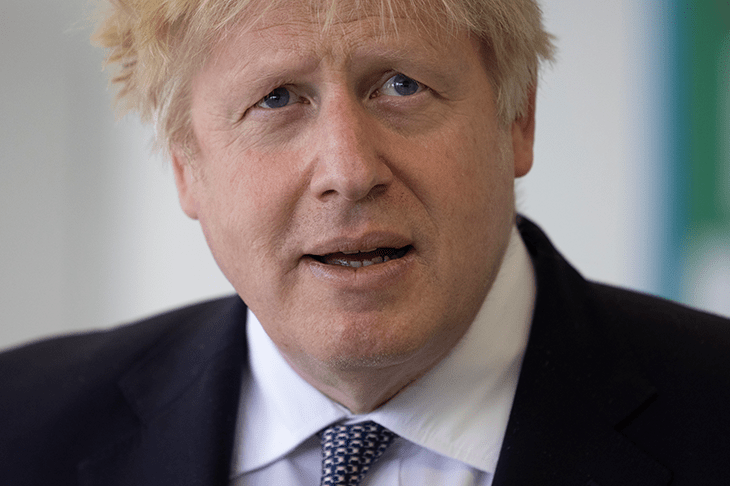A slogan can come back to haunt you. For Boris Johnson, the words ‘data not dates’ sounded powerful at a time when Covid cases were high and hospitals full. The idea was that the government would be guided by scientific reason, would respond to the figures and would not let rigid targets dictate policy.
Since the Prime Minister announced his roadmap at the end of February, however, ‘dates’ seem to have become far more important than ‘data’. How can he claim to be following the data when he will not budge from a timeline which now looks like it was designed for a different phase of the pandemic? Why were people braving the cold and rain outside restaurants on a bank holiday when there is every chance it’s safe to go inside?
There is nothing in the data, we are told, to suggest we should further delay the dates laid out in the roadmap. But is there anything in the data that makes it inappropriate to bring reopening forwards, given the economic and societal harm the restrictions still inflict? Even Professor Neil Ferguson, whose controversial Covid modelling informed the lockdown policy, now admits there is little justification in making the hospitality industry wait until 17 May to allow customers to eat and drink indoors and to stay in hotels. Nor is there any reason why we should have to wait until 21 June for theatres and sports venues to fully reopen, or for a relaxation in social distancing. The risk of a serious third wave over the summer and autumn, Ferguson says, has all but disappeared thanks to the success of the vaccination programme.
We will never be free of the risk of a new pandemic. But we can’t keep ordinary life on hold for ever
At a time when we should be working to restore freedoms the government is pushing in a different direction. When the Prime Minister announced his roadmap in February, there was no mention of vaccine passports — indeed, the vaccines minister ruled them out. But an official review into their applicability is still ongoing.
There was no mention either of a continuing requirement for masks, social distancing and obsessive weekly testing: 21 June was the date, we were led to believe, when life would be back to normal. Since then, numbers of infections, hospitalisations and deaths have continued to fall ahead of predictions. Yet week by week, new ways of keeping society in the emergency ward are dreamed up.
Pupils in secondary schools are still being forced to wear masks; yet with twice-weekly testing, less than 0.4 per cent of pupils are testing positive. At what point will ministers accept that lateral flow testing on this scale is now pointless, and represents a waste of public money? Tests show 85 per cent of over-sixties now have Covid antibodies: it’s hard, perhaps impossible, to see how a third wave could threaten to overwhelm health services again. So far, there’s no evidence that new variants have changed the equation.
To use vaccine passports to exclude people from mass events would be a big change in a democracy that has never accepted identity cards for people going about their lawful business. No. 10 has already admitted that such documents would be discriminatory. Analysis of the vaccine figures by The Spectator’s data hub project show that, among whites, vaccine uptake is high — barely 10 per cent of Caucasians over the age of 50 are unvaccinated. But that figure is 28 per cent among south Asians and 35 per cent in the black community. Can ministers really turn a blind eye to the sort of discrimination vaccine passports threaten? The idea should be dropped without delay.
Johnson was right when, as editor of this magazine, he denounced identity cards as an affront to British liberty and a capitulation to the security state. The fact that an official Covid ‘certification’ system could be implemented long after almost everyone has received their first jab raises even more suspicions as to its actual purpose.
Israel is finding out that its ‘green card’ is unnecessary in a population that now has high levels of immunity. It’s crucial that MPs do not vote to approve Covid certification, or whatever new name is given to these bio-security cards. They are unnecessary, unwelcome and un-British.
We will never be entirely free of the risk of a new pandemic. We could be struck down at any time by a completely different virus, perhaps a novel influenza virus. But we can’t keep ordinary life on hold for ever. Only this week have some care home residents been allowed out of their accommodation for the first time in a year. They have been subject to degrading regulations that have been justified in the name of their safety.
One of the things we have learned from this crisis is how hard it is for those in power to relax illiberal measures which they have imposed under emergency conditions even once the situation improves. When politicians adopt the habit of ‘government by command’, they cease to trust people to make decisions about their own lives. At some point, however, this government is going to have to acknowledge that the pandemic is over in Britain, and that normal life can resume without the medicalisation of everyday life. The figures suggest that date should come sooner rather than later.






Comments